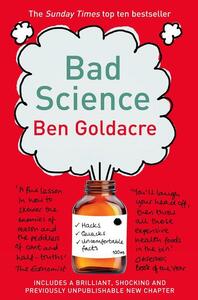Take a photo of a barcode or cover
Maybe 2.5 stars. It was ok. I didn't like Goldacre's style of writing much, and there were errors that should have been picked up at editing.
Working in research I knew a lot of what he was talking about already: that not all research is properly done and all has its flaws etc. I've also never trusted a journalist or a homeopath so that was nothing new. But it was interesting and enlightening (frightening) to extent to which some of them will go.
I think maybe someone who doesn't know that much about research may benefit from the book more than I did. And as he repeatedly says, he's making things easier to understand so that it's readable for everybody not just 'geeks' like himself. I especially think that people who believe that what they read in the news is always correct and the 'specialists' or 'experts' quoted are actually experts in the field and/or are credible should read this.
His little footnote on page 254 irritated me: 'I'd be genuinely intrigued to know how long it takes to find someone who can tell you the difference between 'median', 'mean' and 'mode' from where you are sitting right now.' Sitting reading your book you cocky little shit. That was one among quite a few little remarks that makes him seem like he thinks he is one of very few people who actually understands research. I found myself complaining out loud to my partner about a few of the things he says because they were irritating. This is why I cannot rate the book higher, and why 3 stars may be too generous.
Working in research I knew a lot of what he was talking about already: that not all research is properly done and all has its flaws etc. I've also never trusted a journalist or a homeopath so that was nothing new. But it was interesting and enlightening (frightening) to extent to which some of them will go.
I think maybe someone who doesn't know that much about research may benefit from the book more than I did. And as he repeatedly says, he's making things easier to understand so that it's readable for everybody not just 'geeks' like himself. I especially think that people who believe that what they read in the news is always correct and the 'specialists' or 'experts' quoted are actually experts in the field and/or are credible should read this.
His little footnote on page 254 irritated me: 'I'd be genuinely intrigued to know how long it takes to find someone who can tell you the difference between 'median', 'mean' and 'mode' from where you are sitting right now.' Sitting reading your book you cocky little shit. That was one among quite a few little remarks that makes him seem like he thinks he is one of very few people who actually understands research. I found myself complaining out loud to my partner about a few of the things he says because they were irritating. This is why I cannot rate the book higher, and why 3 stars may be too generous.
I really enjoyed the topic. I'm less fond of his writing style. It seems like a good thing for a lot of people to read, if they could make it through.
informative
reflective
medium-paced
This was so good! For me, it was the perfect combination of intellectual material and humour, and it was presented in a way that was engaging and easy to understand. I was surprised at how many of his examples and ideas I had encountered before in various walks of life, but I really enjoyed how logical (and pretty much irrefutable) the justifications for his arguments were. I would love to hear him speak!
Vermakelijk en pijnlijk tegelijk. Desondanks gaat t niet heel veel verder dan aanwijzen hoe verrot de media rapporteert. Kan die man niks aan doen, maar bij wijze van entertainment snap je de boodschap ook wel na 1 hoofdstuk. Eigenlijk is het schandalig dat er nog niks veranderd is.
This book should be required reading for everyone. It teaches essential skills for wading through the barrage of poorly researched media pieces and fiendish marketing ploys that aim to make you make poor and costly decisions about your health. It should be an eye opener for anyone. It is a bit UK-centric, but the lessons are universal.
The content of this was so interesting. I found the author a bit annoying at times.
An outstanding demolition of several different categories of quackery, the scientific illiteracy of the media and a tutorial on how to decode the unending stream of dubious claims and doubtful qualifications which continue to be swallowed whole by the media and the more gullible end of the population.
challenging
informative
sad
tense
slow-paced



